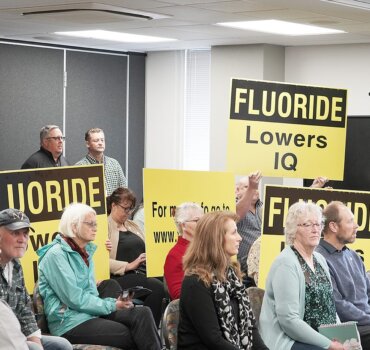
The News ran an article in September headlined Fluoride call still a mystery.
I’m not sure why The News is still finding the fluoride “call” a mystery. Perhaps they’re not listening to and reporting facts and overwhelming scientific evidence.
This issue is not just one of numbers and the council having to spend money on putting a naturally occurring mineral in our drinking water. It is an issue of health, wellbeing and kaitiakitanga of the future generations of New Zealanders.
My reply is from a professional perspective, with 30 years’ experience in science, dental surgery and education. The News likes to use numbers so I will start with a few.
Dental disease, dental decay and oral health infections are the number one reason children in all areas of New Zealand are admitted to hospital. These are also the most common chronic diseases in our country not just for children but for all New Zealanders. These diseases are all preventable. Each hospital visit for one of our children costs approximately $3500.
The News has reported it will cost Waipa $480,000 initial costs and $130,000 annually, to maintain a fluoridated water supply. Much, if not all of this cost can be applied for through the financial assistance package of $11.3 million, which is also quoted in the article.
A simple calculation suggests we would cover the costs of approximately 137 children with the equivalent of the initial set up costs and a further 37 children each year after that. This offsets the cost of a small number of the children who have decayed teeth in Te Awamutu, and Cambridge.
This is simple preventative medicine, not the ambulance at the bottom of the cliff medicine. These are only the monetary costs for treating these very sick young New Zealanders, usually under general anaesthetic, in our already overcrowded and overworked hospital systems.
The overall detriment to their general health, wellbeing, social and mental health and that of their families is unquantifiable.
Once these children, who are suffering with significant pain and disease have had some or all of their baby teeth removed they have difficulty eating, and therefore their diet and nutrition is compromised.
They have difficulty socially, speech development can be impaired and the eruption of adult teeth is compromised, leading to crowding and malfunction of the dentition.
This is simple preventative medicine, not the ambulance at the bottom of the cliff medicine.
Think of the baby teeth like trainer wheels one uses riding a bike, they are needed to learn all the above, and to guide the adult teeth into the correct position for optimal health and wellbeing.
As a result many hundreds New Zealanders are growing up with significant oral health compromises. This has severe lifelong unquantifiable health consequences.
Water fluoridation has, for over 60 years, been added in tiny amounts to some of New Zealanders water, creating huge oral health benefits.
There is an overwhelming body of scientific evidence showing the direct oral health benefits to all people drinking fluoridated water. Most recently (2009) showing a decrease in oral disease of 40 per cent in children and approximately 20-30 per cent in adults.
I would like anyone who is still feeling that this ‘call’ is a mystery to compare this huge body of evidence to absolutely no statistically significant evidence of the detrimental effects touted by a small number of yellow banner wavers at our roundabout.
- Dr Roberts is a Fencourt based dental surgeon, with experience in community, hospital, private and public dentistry in New Zealand and overseas.









